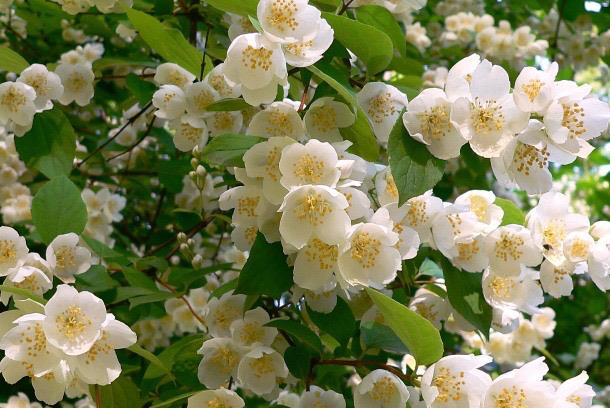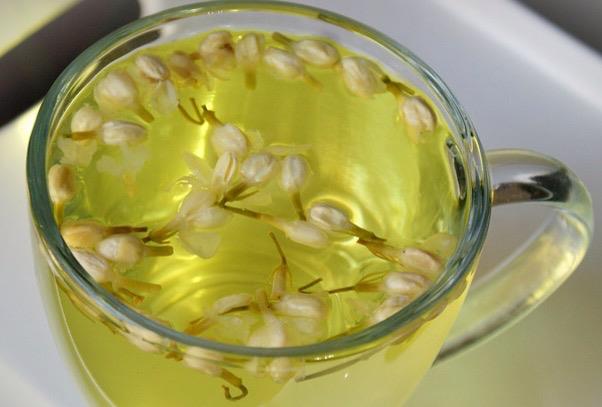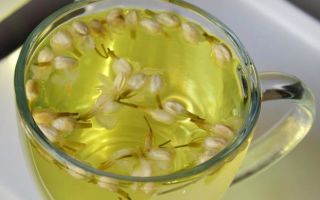Content
- 1 What is jasmine
- 2 The chemical composition and calorie content of jasmine tea
- 3 Health benefits and harms of jasmine
- 4 The benefits of green jasmine tea
- 5 Can pregnant and lactating women drink jasmine tea?
- 6 Jasmine Slimming Tea
- 7 How to collect and dry jasmine flowers for tea
- 8 How to make jasmine tea
- 9 How much jasmine tea can you drink per day
- 10 Jasmine face tea
- 11 The harm of jasmine tea
- 12 Contraindications to drinking jasmine tea
- 13 How to choose and store jasmine tea
- 14 Conclusion
- 15 Reviews
The health benefits and harms of jasmine tea primarily depend on the quality of the drink and the knowledge of when to limit its use. The ability to properly brew jasmine tea will help to make the drink delicious. The medicinal properties of jasmine, its composition, description, indications for use in various diseases, use in cosmetology, especially during pregnancy, the choice of jasmine tea - all these questions should be studied before use.
What is jasmine

Jasmine is an evergreen with fragrant flowers. It is often confused with chubushnik. Chubushnik has larger flowers and numerous bright yellow stamens. Jasmine has only 2 stamens, they are hidden in a long corolla and are almost invisible. The main difference is that jasmine is a tropical plant and cannot grow in open ground in mid-latitudes, in contrast to the frost-resistant garden "jasmine" (mock orange). Jasmine comes in white, yellow and pink. Plant height - from 1 to 3 meters. The fruits are inedible. Some species bloom all year round. In temperate climates, the plant is grown in residential buildings, greenhouses, greenhouses.

The chemical composition and calorie content of jasmine tea
Jasmine contains:
- essential oils;
- organic acids;
- alkaloids;
- tannins (in leaves);
- vegetable proteins;
- vitamins and minerals.
Most of these nutrients go into jasmine tea. Provided that the plant is brewed not with boiling water, but + 80 ° C water.
The calorie content of jasmine tea is 1 kcal per 100 g.
Health benefits and harms of jasmine
For medicinal purposes, medicinal jasmine with white flowers is used.
Jasmine has on the human body:
- antiseptic;
- anti-inflammatory;
- pain reliever;
- antispasmodic;
- tonic;
- fortifying action.
Jasmine has a beneficial effect on the nervous system and is used in the treatment of vegetative-vascular dystonia and chronic bronchitis. It is used in ophthalmic practice. Normalizes the emotional background, improves mood. Jasmine infusion helps with varicose veins and thrombosis. It is used as a prophylactic agent for stroke and oncology. Jasmine improves the condition in the treatment of neuroses, reduces anxiety, relieves psychological stress.
People suffering from hypertension should keep in mind that jasmine increases blood pressure.
Jasmine essential oil is used in cosmetology, massage and aromatherapy.
The benefits of green jasmine tea
The healing properties of jasmine are also shown in combination with green tea. The drink has a pronounced tonic effect. Stimulates brain function and physical activity. It is a natural antidepressant. Improves digestion.
Has antibacterial properties. Promotes increased libido. Helps with chronic fatigue. Properly brewed jasmine green tea is a vitamin-boosting, tonic beverage that provides health benefits when consumed wisely.
Can pregnant and lactating women drink jasmine tea?
Green tea with jasmine during pregnancy is recommended to be consumed in moderation, given the stimulating effect of the drink. Better to make it weak.
This can cause hyperactivity and sleep disturbance in the infant. You can drink jasmine alone or in combination with caffeine-free herbal teas.

The benefits of a jasmine drink during pregnancy and lactation are its beneficial effects on the emotional and psychological state of a woman. Stress resistance and mood improves. Jasmine also helps to normalize hormonal levels.
Jasmine Slimming Tea
The benefits of jasmine tea for women are due to its healing and fat burning properties.
Jasmine tea:
- accelerates metabolism;
- helps cleanse the body;
- reduces the level of "bad" fats;
- improves bowel function.
How to collect and dry jasmine flowers for tea
Jasmine flowers bloom in the dark. They are harvested at night or at dawn. At this time, the concentration of essential oils in flowers is maximum. Collect only healthy, undamaged inflorescences by insects. You need to try to pluck so that the petals do not scatter, and the flowers remain intact. Jasmine flowers are harvested both in full bloom and in buds.
As a container, you can use a wicker basket or a cloth bag made of cotton fabric. A regular, clean pillowcase will do. Raw materials should not be compacted.
Before drying, the flowers, if necessary, are sorted out and cleaned of impurities. No need to wash. Lay out a thin layer on paper. Stir occasionally to dry evenly.
You can use an electric dryer. The temperature regime must be set gentle: up to +40 ° C. Do not overdry. It is not recommended to dry jasmine flowers in the oven.
How to make jasmine tea
Jasmine flowers look beautiful in a glass teapot. The water temperature should not exceed +80 ° C. This way vitamins are better preserved.
Jasmine tea can be brewed with other medicinal plants. In this case, the health benefits will be greater. The readiness of tea is determined by the degree of disclosure of flowers and personal preferences for the strength of the drink. Jasmine tea can be consumed after a couple of minutes of brewing.
How much jasmine tea can you drink per day
To stay healthy, you need to drink enough fluids throughout the day to stay hydrated. The average rate is 2 liters per day, but one should focus on individual needs. Jasmine tea quenches thirst well and saturates the body with useful substances.
Jasmine face tea
Jasmine flowers soften when brewed and can be used to benefit the skin by preparing a cosmetic face mask. Flowers should be kept in hot water for a few minutes. Then they need to be cooled.
To prepare a jasmine mask for problem skin prone to inflammation, you can use the following recipe:
- Squeeze the juice from half a lemon.
- Mix the juice with 2-3 tablespoons of cosmetic clay (blue, green or pink).
- Add the jasmine infusion to the resulting mixture until a creamy consistency is obtained.
- Mash the jasmine flowers and mix everything thoroughly.
Keep the mask on the skin for 10-15 minutes. Wash off with cool water. Use 1-2 times a week.
This mask has anti-inflammatory and antibacterial properties, improves complexion and removes fine wrinkles.
It is not recommended to mix the mask ingredients in a metal container. Use a plastic, wood or ceramic spoon to stir.

The harm of jasmine tea
With excessive consumption of strongly brewed tea with jasmine, the drink can provoke an exacerbation of gastrointestinal diseases and lead to overexcitation of the nervous system.
With diabetes mellitus, you should drink jasmine tea with caution, as it can dramatically increase glucose levels. Pregnant and lactating women should also not abuse this drink.
Contraindications to drinking jasmine tea
It is recommended to limit or completely eliminate the use of jasmine tea in the following cases:
- with exacerbation of gastrointestinal diseases;
- in case of sudden jumps in blood pressure;
- if you have a history of mental illness;
- with allergic reactions.
How to choose and store jasmine tea
If you need to buy quality tea, then you should adhere to the following rules:
- Do not buy tea bags.
- Read the composition and choose a product without artificial fillers in the form of colors and flavors.
- Look at the price: good tea cannot be cheap.
Tea bags are easy to use, but they contain few health benefits. They contain waste from tea production and a lot of artificial additives. If such a product says “tea with jasmine”, then we are talking about a flavoring agent, and not about natural jasmine.
Jasmine tea is stored in a tin or glass container.
Conclusion
The benefits and harms of jasmine tea are due to the biochemical composition of the drink and its value for the human body. The drink prepares quickly. It has a pleasant aroma. Jasmine flowers transform tea into an original product. The healing properties of jasmine are used in medicine and cosmetology. Tea has health benefits when consumed in moderation, energizing the body and mind. It is a good alternative and addition to regular tea.

